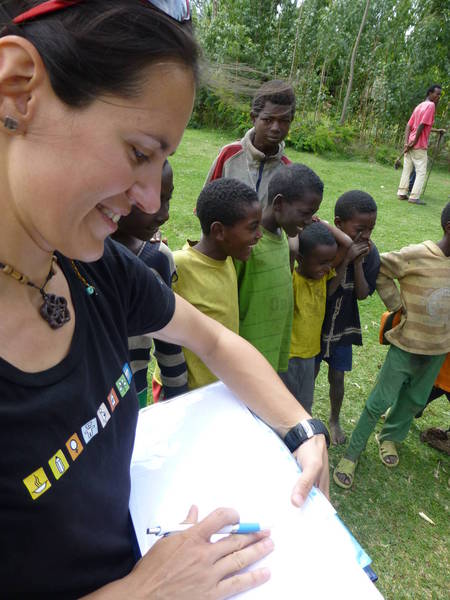In August 2014, Dominika Kobzová and Jana Smolíková, experts from the Research Institute for Soil and Water Conservation, left for the Ethiopian Woreda (regions) of Kedida Gamel. At the invitation of Caritas CR, they went there to carry out research to clarify the cause of local landslides and to propose appropriate solutions to protect against this in the future.
The research was carried out in three areas - Agara Taza, Taza Garba and Keretchicho. In addition to the causes of landslides, the research should provide more information about sustainable land use and how this will prevent further washing away and damage to infrastructure.
Each landslide reduces the chance for local residents to provide their own food self-sufficiently and exposes them to the risk of malnutrition and other related diseases. In the long term, the underestimating of land management and lack of respect for its potential and reserves, poses a threat to a significant proportion of Ethiopian land and local nutrition.
In some places, in just two years the soil shifted so much that it undermined road access to kebels and created numerous ravines resembling a lunar landscape. The research study will propose measures for rehabilitation in these areas.
 Such methods might include leveling with the help of gabions (wire baskets filled with stones), natural dams made of wooden sticks filled with leaves and small twigs and other measures of slope stabilization such as planting grasses, trees and shrubs with anti-erosion effects. In locations where conditions permit, the land can also be used for agricultural activity - for example, for the production of vegetables or for hedging purposes, beekeeping and honey production cooperatives.
Such methods might include leveling with the help of gabions (wire baskets filled with stones), natural dams made of wooden sticks filled with leaves and small twigs and other measures of slope stabilization such as planting grasses, trees and shrubs with anti-erosion effects. In locations where conditions permit, the land can also be used for agricultural activity - for example, for the production of vegetables or for hedging purposes, beekeeping and honey production cooperatives.
One of the planned outcomes of the study is the creation of a recommended list of suitable plants that thrive in a given soil type or varieties of trees that would be suitable for bees.
For local residents who consider damaged land as redeemable as barren rock, the possibility of using land for different purposes will mean a significant increase in fertility and thus income. In addition to this, there will be significant knowledge acquired during the training sessions on topics such as irrigation or growing vegetables, population use and ensuring sustainable management of land and water resources within closed areas. The success of good practice in the reconstruction of devastated areas will also be disseminated.
This research is part of a project implemented by Caritas CR which has operated in Ethiopia since 2011. The Ethiopian Catholic Church and Caritas Great Britain (CAFOD), Scotland (SCIAF) and Ireland (Trocaire) have cooperated in activities in the region Kedida Gamel since the beginning of 2014.







